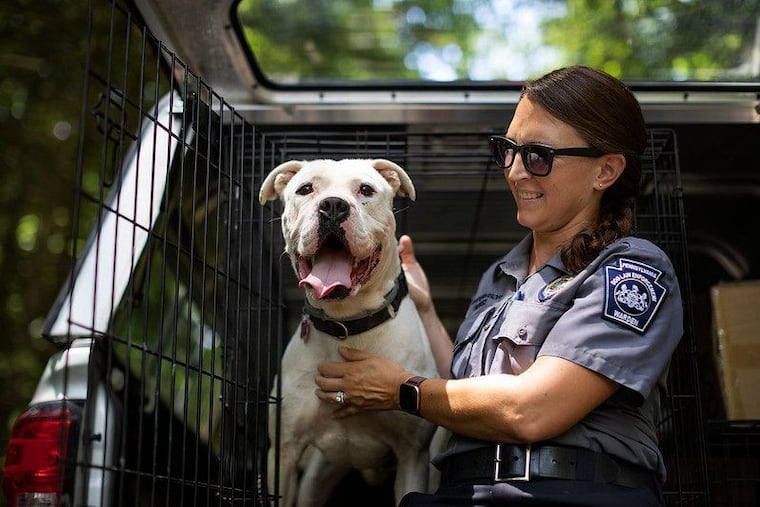Pa. dog wardens, spread thin, are seeking budget increase
The Pennsylvania Bureau of Dog Law Enforcement is seeking to increase the cost of a yearly spayed/neutered dog license from $6.50 to $10.

Pennsylvania’s Bureau of Dog Law Enforcement was founded in 1893 in response to loose dogs attacking livestock. Dog wardens still deal with livestock kills on farms today, along with investigating the state’s notorious puppy-mill breeders and inspecting thousands of kennels.
In an online news conference Thursday morning, officials with the Pennsylvania Department of Agriculture said the bureau, which it oversees, has been operating on the same budget for 25 years and needs its first dog license fee increase in decades.
“Farmers are directly impacted by not raising the dog license fee,” said Agriculture Secretary Russell Redding.
The bureau’s budget — $8.6 million — is funded through dog license sales, and with constant shortfalls, officials said tax dollars are being diverted to maintain service. Under the proposal, the bureau is seeking to increase the cost of a yearly spayed/neutered dog license from $6.50 to $10. The proposal would require puppies to be licensed at 8 weeks.
Fees were last raised in 1996.
“We’re suffering,” said Megan Horst, the dog warden supervisor for Southeastern Pennsylvania.
Horst, 36, said the bureau currently doesn’t have a dedicated warden for Lancaster and Montgomery Counties. Lancaster in particular is a hotbed for complaint calls, she said, home to nearly 300 kennels, and she often has to call in wardens from other counties for help.
“With a fee increase, the hope is to fill those positions,” Horst said.
Two farm owners who joined the news conference said the bureau’s dog wardens helped them after livestock kills, finding the responsible dogs and helping secure restitution. The Bureau of Dog Law Enforcement has paid $237,000 on 155 claims to cover losses for farmers over the last decade.
The bureau, according to a Department of Agriculture spokesperson, has 57 staff members, including 46 wardens, seven supervisors, a veterinarian, and administrative staff. There are currently 14 vacant positions.
Farmer Deborah Capuzzi, of Northumberland County, said she first suspected coyotes attacked and killed several sheep and ewes last year but her local dog warden knew the difference.
“There was nothing eaten,” she said of the slain animals. “There were all kinds of terrible bite marks round the head, the neck, and the ears. It was quite upsetting to us.”
The warden, she said, was able to track the loose dogs and she’s pursuing charges and restitution.
Philadelphia has its own dog licensing program, separate from the state, with licenses for spayed/neutered dogs costing $16 annually, said Sarah Barnett, director of development and communications for ACCT Philly, the city’s animal care and control team.
“We’re very supportive of this legislation,” Barnett said. “The dog wardens, when ACCT was really struggling with kennel outbreak, really helped. They have a real impact on issues all over the state.”